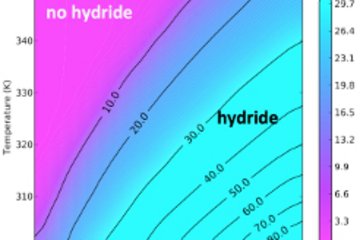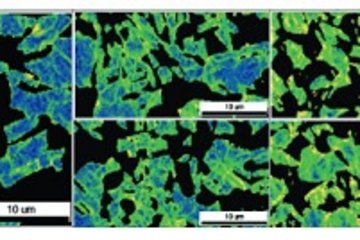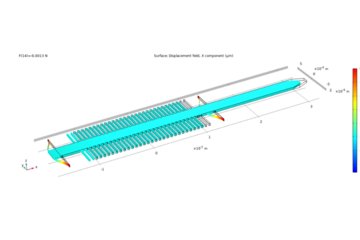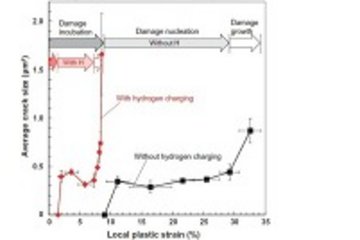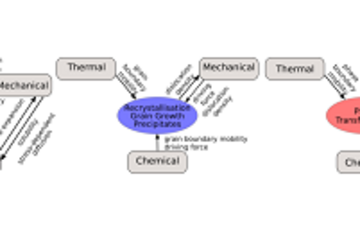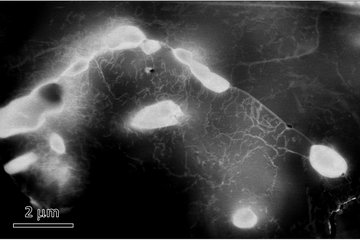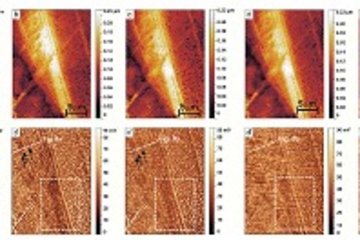All genres
141.
Talk
Fe3Al surfaces in dry and humid oxygen atmosphere. DPG Frühjahrstagung, Regensburg, Germany (2013)
142.
Talk
Aligning electronic energy levels in electrochemical systems. DPG Frühjahrstagung, Regensburg, Germany (2013)
143.
Talk
Extending the Concept of Semiconductor Defect Chemistry to Electrochemistry. TMS Annual Meeting, San Antonio, TX, USA (2013)
144.
Talk
Extending the concept of semiconductor defect chemistry to electrochemistry. CMD-24/ECOSS-29/ECSCD-11, Edinburgh, UK (2012)
145.
Talk
Extending thermodynamic concepts combined with first-principles calculations to address questions related to aqueous corrosion: Potential and challenges. Seminar talk at Universität Ulm, Lehrstuhl für Theoretische Chemie, Ulm, Germany (2012)
146.
Talk
Ab-initio Study on Liquid Metal Embrittlement in the Fe/Zn System. DPG Frühjahrstagung 2012, Bochum, Germany (2012)
147.
Talk
Interactions of 2nd row high electron affinity elements with Mg(0001). DPG Frühjahrstagung 2012, Berlin, Germany (2012)
148.
Talk
On the accuracy of ion hydration energies - An ab-initio study. DPG Frühjahrstagung 2012, Berlin, Germany (2012)
149.
Talk
Ab initio study of stability of Fe3Al surfaces in contact with an oxygen atmosphere. DPG Frühjahrstagung 2012, Berlin, Germany (2012)
150.
Talk
Extending the concept of semiconductor defect chemistry to electro-chemistry: Potential and challenges. Seminar talk at Lehrstuhl für Theoretische Chemie, Universität Duisburg-Essen, Essen, Germany (2012)
151.
Talk
Combining ab initio calculations with thermodynamic concepts to address questions related to aqueous corrosion. Seminar talk at Lehrstuhr für Theoretische Chemie, TU München, München, Germany (2012)
152.
Talk
Ab initio study of stability of Fe3Al surfaces in contact with an oxygen atmosphere. 1st Austrian/German Workshop on Computational Materials Design, Kramsach, Austria (2012)
153.
Talk
Theoretical study of the environmental effect of H-containing gases on Fe–Al surfaces. FeAl2011, Discussion Meeting on the Development of Innovative Iron Aluminium Alloys, Lanzarote, Canary Islands, Spain (2011)
154.
Talk
Extending the concept of semiconductor defect chemistry to electro-chemistry: Constructing electro-chemical E/pH diagrams based on ab-initio calculations. Workshop ''Modern developments in the ab initio description of charged systems for semiconductors and electrochemistry", Ringberg, Germany (2011)
155.
Talk
Stabilisation of polar ZnO(0001) surfaces in dry and humid environment. Fritz-Haber-Institut der MPG, Theorie-Seminar, Berlin, Germany (2011)
156.
Talk
Role of vibrational contributions for the elastic properties of hexagonal ice. CM-Workshop, Attendorn, Germany (2011)
157.
Talk
Stability of polar ZnO(0001) surfaces in dry and humid atmosphere. TYC Workshop ''Thermodynamics and kinetics of dopants, defects and adatoms at surfaces'' at University College London, London, UK (2011)
158.
Talk
Hydrogen adsorption on polar ZnO(0001)–Zn - Extending equilibrium surface phase diagrams to kinetically stabilised structures. March meeting of the American Physical Society (APS), Dallas, TX, USA (2011)
159.
Talk
Hydrogen adsorption on polar ZnO(0001)–Zn - Extending equilibrium surface phase diagrams to kinetically stabilised structures. DPG Frühjahrstagung 2011, Dresden, Germany (2011)
160.
Talk
On the accuracy of ion hydration energies - An ab initio study. 1st Austrian-German workshop on Computational Materials Design, Kramsach, Austria (2011)




